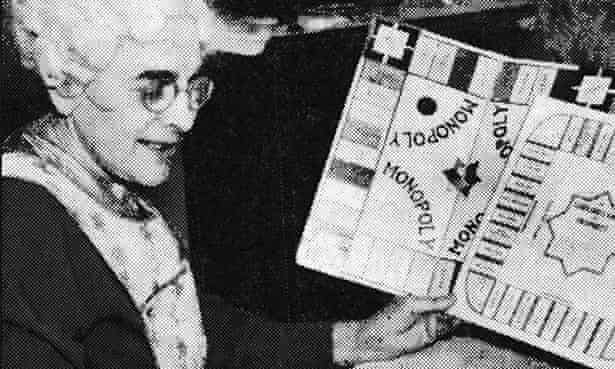The Games People Play
As a small businessman to be, I wish I had been more competitive at Monopoly.

I was terrible at Monopoly.
I know it’s a game of chance using dice but what I was terrible at was making decisions about what to buy or not to buy. I don’t ever remember winning.
I do remember always wanting to be the little metal terrier. (That was the ‘Scottie’ which has since been replaced by a robot. Or so I’ve been told.) I loved that game piece. It reminded me of my first dog, Lady MacTavish, who was generously referred to as a Skye Terrier.
She was just as likely a mutt.

Monopoly’s given name by its original creator, Lizzie Magie, was The Landlord’s Game. Ms. Magie was an inventor of games, as well as '“a stenographer and typist at the Dead Letter Office in Washington, D.C., a repository for the nation’s lost mail”, and with this game she hoped to demonstrate how capitalism worked.
A firebrand against the railroad, steel and oil monopolists of her time, Lizzie Magie told a reporter in 1906, “In a short time, I hope a very short time, men and women will discover that they are poor because Carnegie and Rockefeller, maybe, have more than they know what to do with.”
Like many games, it was circulating for awhile amongst the public in primitive form before being patented, sold and mass produced by the Parker Brothers in 1935. Just as the game of Mafia was introduced to me in 1990 in pure oral form. And then, the next thing I knew, upper crust New Yorkers were playing the game of lies and deceit as ‘black tie affairs’ and - apparently - Andy Warhol became a huge fan. Not long after that it came out as a card game, though it never needed cards in the beginning.
In reference to Monopoly, the rags-to-riches Horatio Alger story told by Parker Brothers went like this:
In the 1930s, at the height of the Great Depression, a down-on-his-luck family man named Charles Darrow invented a game to entertain his friends and loved ones, using an oilcloth as a playing surface. He called the game Monopoly, and when he sold it to Parker Brothers he became fantastically rich—an inspiring Horatio Alger tale of homegrown innovation if ever there was one.
They did not credit Lizzie Magie with the invention of the game. An origin story involving someone striking it rich - which Darrow did with his version which was just an iteration of Lizzie Magie’s circulating game - fit more neatly into the idolization of the American Dream.
Ms. Magie was hoping to open Americans’ eyes to the slash-and-burn aspects of capitalism while the Parker Brothers wanted to highlight the thrill of winner take all. Creating a monopoly and beating all other players into submission. Literally bankrupting them.
I am only just learning the role this single woman - or “spinster” as she would have been referred to in the early 1900’s - played in the development of Monopoly. But I am pretty sure I saw the game as she intended it to be seen - crass capitalism, conspicuous consumption, conscience cronyism.
Another recollection of my Monopoly playing days was that players would “steal” from the bank. A level of unfairness I could never stoop to. In fact, purposely inflating or exaggerating rents was considered just ‘what you did’ as a capitalist hellbent to win no matter the cost, no matter what rules were broken, no matter how unfair it might be to the other players.
Apparently, Lizzie Magie meant there to be two sets of polar opposite rules for the game.
From its inception, the Landlord’s Game aimed to seize on the natural human instinct to compete. And, somewhat surprisingly, Lizzie created two sets of rules: an anti-monopolist set in which all were rewarded when wealth was created, and a monopolist set in which the goal was to create monopolies and crush opponents. Her vision was an embrace of dualism and contained a contradiction within itself, a tension trying to be resolved between opposing philosophies. However, and of course unbeknownst to Lizzie at the time, it was the monopolist rules that would later capture the public’s imagination.
I think I was playing by the anti-monopolists rules all along out of a sense of fairness and decency and, in keeping with the times and alternative facts and such, that’s my story and I am sticking to it. No matter how ludicrous.
It’s little wonder I continually got my ass kicked.
###
Speaking of games, there’s a game called Pandemic that my brothers and I played a while back when we were vacationing together in St. George, Utah. I thought of it while writing about Monopoly and Lizzie Magie’s two sets of rules because you play Pandemic collaboratively. As a team, you are trying to prevent the pandemic from happening. Imagine that. Collaborating and cooperating to prevent the spread of a deadly virus.

Also, the other interesting historical aspect of Monopoly - that took off like wildfire once the commercial version was introduced - is that during World War II the game was utilized as a means to deliver maps, compasses, files, money and messages to prisoners of war in Germany. The games were allowed as part of care packages under the Geneva Convention and, so, British airmen were told, in advance of their sorties, to expect, should they be downed and captured, to receive help to escape via the packages delivered by the Red Cross.
You can read more about it in this Atlantic article.
Cheers!




I never really liked it either, and now I know why! I'll stick to your story, too.
Good to have your insightful observations return!